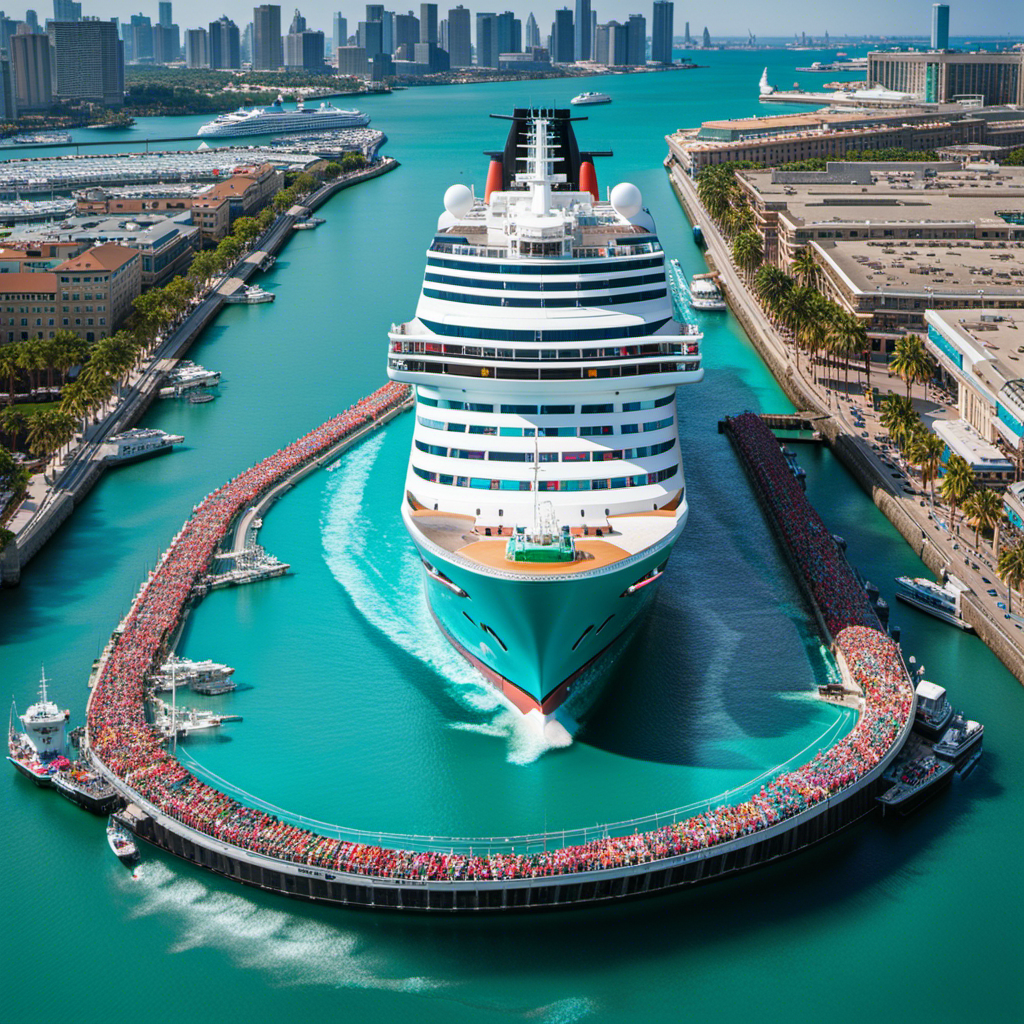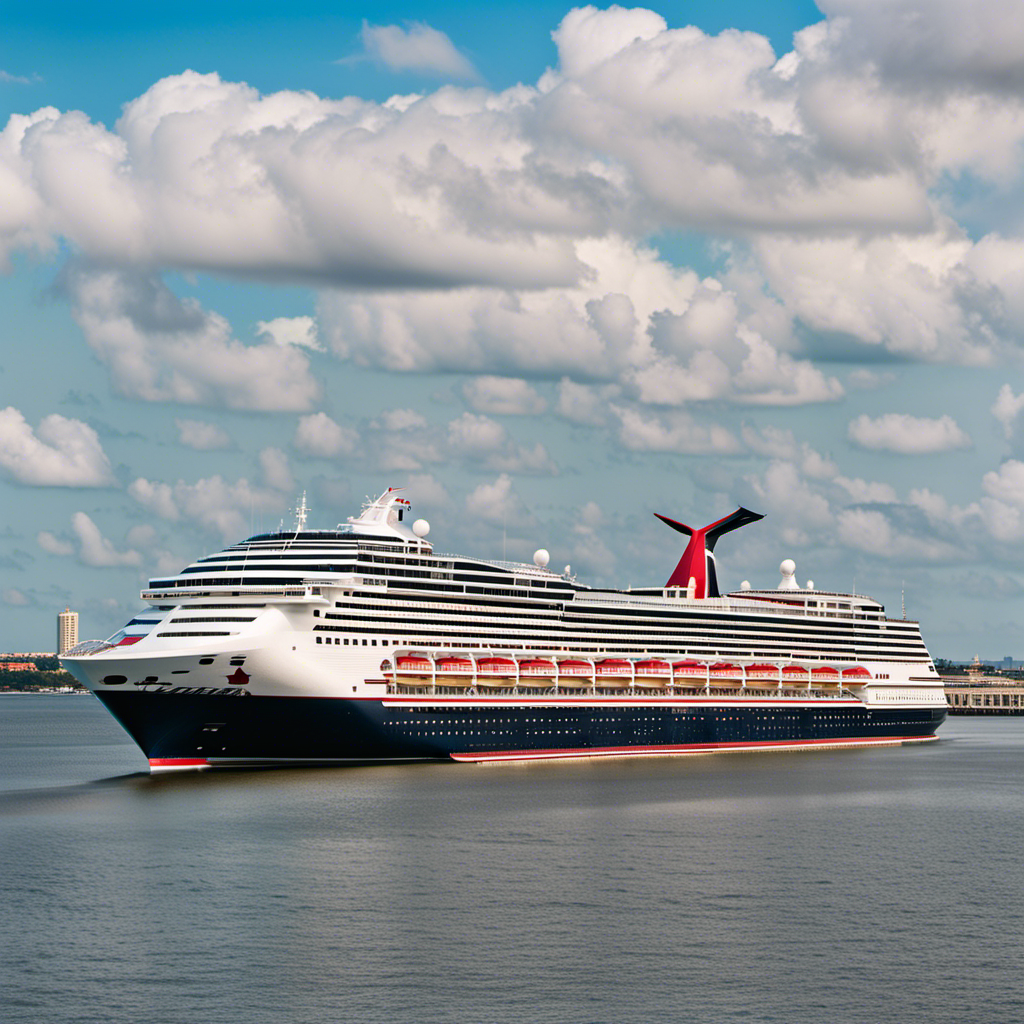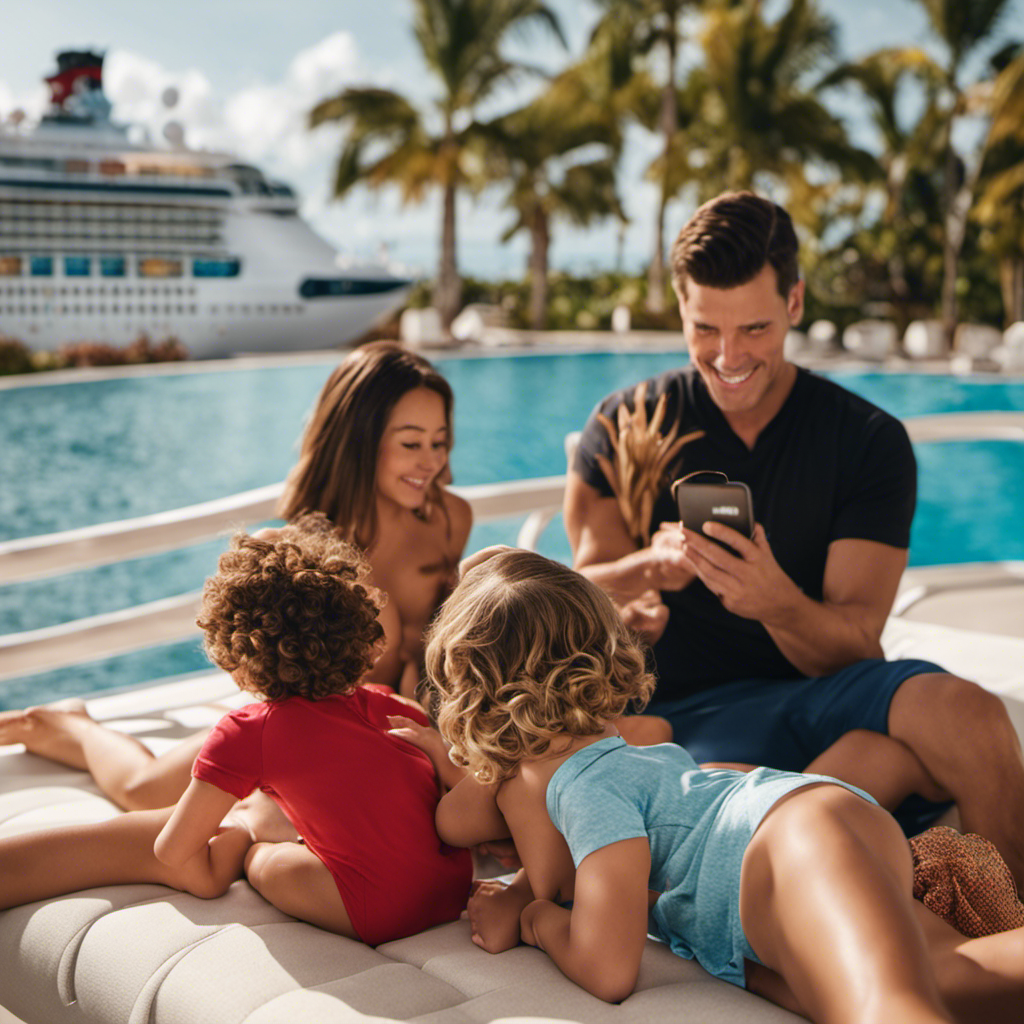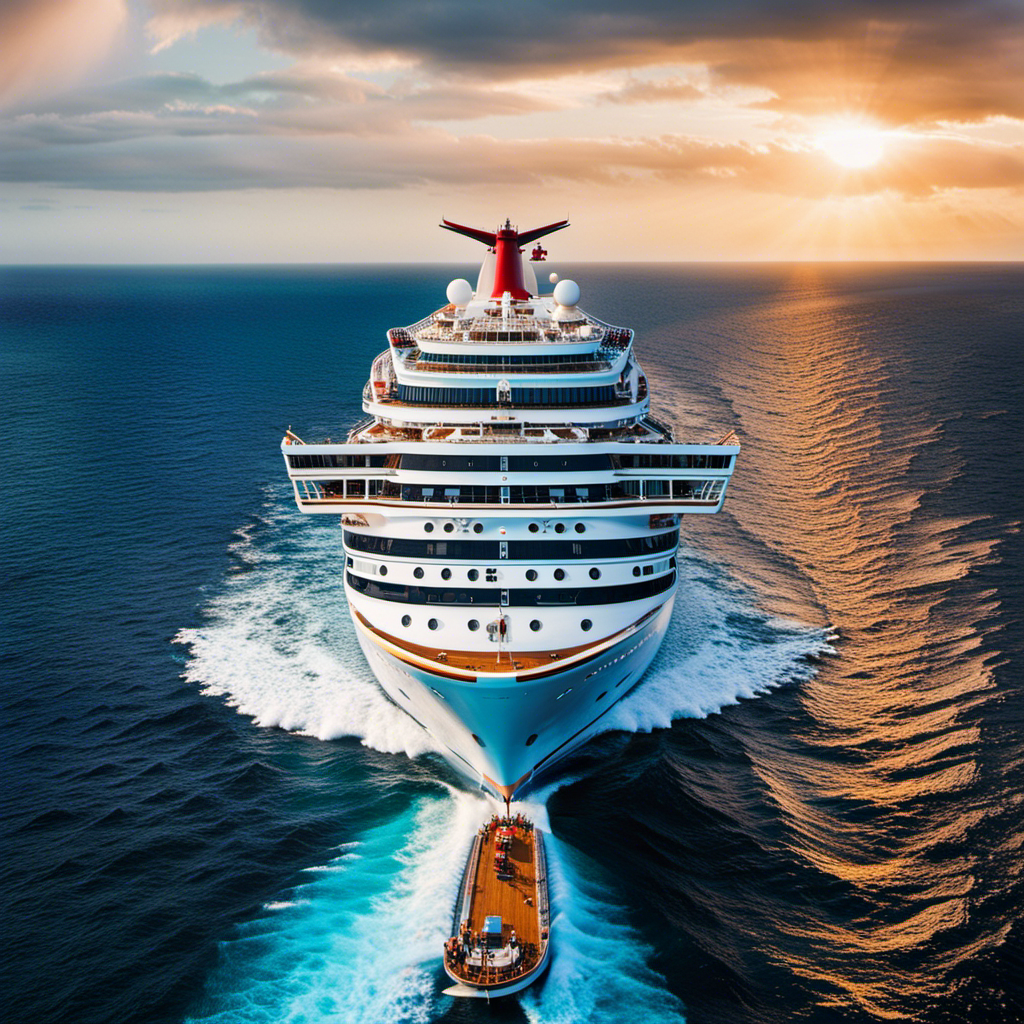Setting forth on an adventure over the sparkling blue waters fills my heart with an intense feeling of excitement and anticipation.
Cruise lines are making their long-awaited comeback in the United States, marking a significant milestone for the industry. Carnival and Royal Caribbean are leading the charge, resuming their voyages this weekend.
With Carnival’s vaccinated passengers requirement and Royal Caribbean’s encouragement of vaccination, challenges still lie ahead. But the return of these majestic ships signifies a hopeful future, despite the lingering threats of COVID-19 variants.
Key Takeaways
- Carnival and Royal Caribbean are set to return to sailing from the United States this weekend.
- Both cruise lines have implemented protocols such as vaccination requirements, testing, lower capacities, and frequent sanitation to help prevent the spread of the virus.
- Despite most passengers being vaccinated, cases of the virus have been found on cruises departing from Caribbean ports.
- The restart of Carnival and Royal Caribbean cruises is an important milestone for the industry, but there are still challenges ahead, including the possibility of more transmissible variants of the virus.
The Long-Awaited Comeback of Carnival and Royal Caribbean
I’m excited to see that Carnival and Royal Caribbean are finally making their long-awaited comeback to sailing from the United States this weekend.
After facing numerous challenges during the restart process, including the impact of vaccination requirements, these cruise lines are eager to welcome passengers back on board.
Carnival Vista and Carnival Horizon will be the first ships to set sail, with enhanced screening measures in place for all passengers. They are also implementing a vaccination requirement for 95%+ of their passengers, ensuring a safer environment on board.
On the other hand, Royal Caribbean’s Freedom of the Seas will follow the CDC’s simulated voyage path, allowing for sailing without the need for 95%+ vaccinated passengers. However, they highly encourage vaccination for all guests.
The return of these cruise lines is a significant milestone for the industry, but challenges and uncertainties still lie ahead. Nonetheless, the implementation of vaccination requirements showcases the industry’s commitment to prioritizing the health and safety of their passengers.
Carnival’s Journey Back to the Seas
Carnival Vista and Carnival Horizon, two ships, will depart from Galveston on a 7-day cruise to Roatan, Belize, and Cozumel.
As part of Carnival’s return to sailing, Carnival Vista’s itinerary offers passengers the opportunity to explore these beautiful destinations. However, in order to ensure the safety of everyone onboard, Carnival has implemented vaccination requirements for Carnival Vista. The ship plans to sail with 95%+ of vaccinated passengers. For those who are unvaccinated, a negative test is required before boarding.
Additionally, enhanced screening will be conducted at the terminal for all passengers. These measures aim to minimize the risk of COVID-19 transmission and create a safe environment for everyone onboard.
Royal Caribbean’s Triumphant Return
Royal Caribbean’s Freedom of the Seas will embark on its first sailing from Miami in nearly a year-and-a-half, offering passengers the opportunity to enjoy a three-night cruise to Nassau and CocoCay.
-
Royal Caribbean’s vaccination policies:
-
Vaccination is highly encouraged, but not required.
-
Unvaccinated passengers will have limited access to certain areas of the ship.
-
Impact of positive cases on cruise operations:
-
Cases of the virus have been found on cruises departing from Caribbean ports, despite most passengers being vaccinated.
-
Crew members have also tested positive before sailings begin.
-
Protocols and contact tracing have helped contain the cases so far.
As Royal Caribbean returns to sailing, they have implemented vaccination policies and safety measures to minimize the impact of positive cases on cruise operations. While vaccination is highly encouraged, it is not mandatory. However, unvaccinated passengers will have limited access to certain areas of the ship.
Despite the vaccination efforts, there have been cases of the virus on cruises departing from Caribbean ports, even with a majority of vaccinated passengers. Additionally, crew members have tested positive before sailings begin. Nevertheless, protocols and contact tracing have proven effective in containing the cases so far.
Royal Caribbean continues to prioritize the safety of its passengers and crew as they navigate the challenges of resuming operations.
Navigating the Challenges of Cruise Restart Protocols
Implementing vaccination requirements, testing protocols, and enhanced sanitation measures are crucial steps in navigating the challenges of cruise restart. The CDC protocols have been put in place to ensure the safety of passengers and crew members.
These protocols include regular testing for all individuals on board, as well as strict sanitation measures to prevent the spread of the virus. In the event of positive cases, cruise lines have established procedures for handling such situations. Contact tracing is conducted to identify and isolate close contacts, and affected individuals are provided with necessary medical attention.
The goal is to contain the spread of the virus and minimize the impact on the overall cruise experience. By adhering to these protocols, cruise lines can provide a safer environment for everyone on board and restore confidence in the industry.
The Role of CDC Oversight and the Florida Injunction
Navigating the challenges of cruise restart protocols, I am concerned about the current status of CDC oversight and the impact of the Florida injunction.
The role of the CDC in ensuring the safety and well-being of passengers and crew members cannot be underestimated. However, the recent injunction in Florida has raised questions about the extent of CDC oversight.
This legal development may have significant implications for the cruise industry as it attempts to resume operations. The injunction challenges the CDC’s Conditional Sailing Order, which outlines the requirements and protocols for cruise lines.
It remains to be seen how this legal battle will unfold and what it means for the future of cruise restarts. The outcome of this case could potentially shape the framework for CDC oversight and influence the industry’s ability to navigate the challenges ahead.
Importance of Vaccination Requirements and Testing
As someone who is eager to ensure the safety and well-being of passengers and crew members, I believe that implementing vaccination requirements and testing protocols is crucial for the successful restart of the cruise industry.
Vaccines have proven to be highly effective in preventing severe illness and reducing the spread of the virus. By requiring passengers to be vaccinated, cruise lines can create a safer environment onboard.
Additionally, testing protocols play a vital role in identifying potential cases and preventing outbreaks. Regular testing can help detect the virus early and allow for prompt isolation and contact tracing.
These measures, combined with enhanced sanitation and lower capacities, will help minimize the risk of COVID-19 transmission onboard.
It is important for cruise lines to prioritize the health and safety of all individuals involved to instill confidence and ensure a successful restart.
Balancing Capacity and Sanitation for a Safe Sailing Experience
To ensure a safe sailing experience, I am carefully balancing the capacity of the ship with thorough sanitation protocols. The table below outlines the measures being taken to prioritize passenger safety:
| Balancing Capacity and Sanitation |
|---|
| – Reduced passenger capacity to allow for social distancing. |
| – Implementing enhanced cleaning and disinfection protocols throughout the ship. |
| – Regularly sanitizing high-touch surfaces and common areas. |
| – Providing hand sanitizing stations throughout the ship. |
Ensuring passenger safety is of utmost importance, especially in light of the ongoing pandemic. By limiting the number of passengers onboard and implementing rigorous sanitation measures, cruise lines are taking proactive steps to minimize the risk of transmission. These measures not only protect passengers but also contribute to the overall well-being of crew members and the communities visited during the cruise. By striking a balance between capacity and sanitation, cruise lines are working towards creating a safe and enjoyable sailing experience for all.
Looking Ahead: Milestones, Challenges, and the Future of Cruising
Looking ahead, I’m excited to see how the future of the cruise industry unfolds, especially with the implementation of new protocols and the ongoing challenges of the pandemic.
There have been significant milestones and innovations in the industry that will shape its future. Here are a few key points to consider:
-
Return of major cruise lines: Carnival and Royal Caribbean are set to resume sailing from the United States, marking a significant milestone in the industry’s recovery.
-
Protocols and safety measures: Cruise lines have implemented vaccine requirements, testing, lower capacities, and frequent sanitation to ensure the safety of passengers and crew.
-
Challenges ahead: Despite these measures, there have been cases of the virus on cruises, highlighting the ongoing challenges of the pandemic and the need for continued vigilance.
-
Adaptation and innovation: The cruise industry has shown resilience by adapting to new protocols and embracing innovations to enhance the passenger experience and address safety concerns.
The future of the cruise industry will undoubtedly be shaped by these milestones and innovations, as well as the ability to navigate the ongoing challenges of the pandemic.
Frequently Asked Questions
What Are the Specific Protocols and Requirements for Unvaccinated Passengers on Carnival Vista and Carnival Horizon?
Unvaccinated passengers on Carnival Vista and Carnival Horizon are required to provide a negative test before boarding. Enhanced screening is conducted for everyone at the terminal. Cruise lines face challenges in restarting operations for unvaccinated passengers.
How Long Has It Been Since Royal Caribbean’s Last Sailing From the United States?
It has been nearly a year-and-a-half since Royal Caribbean’s last sailing from the United States. The return of their cruises marks an important milestone for the industry, but challenges still lie ahead.
What Measures Have Cruise Lines Implemented to Prevent the Spread of COVID-19 Onboard?
Cruise lines have implemented enhanced safety measures to prevent the spread of COVID-19 onboard. These include vaccine requirements, testing, lower capacities, and frequent sanitation. These protocols are crucial in ensuring passenger and crew safety.
What Challenges Have Cruise Lines Faced in Restarting Operations, Despite Most Passengers Being Vaccinated?
Challenges with vaccine requirements and the impact on crew members have hindered cruise lines in restarting operations, despite most passengers being vaccinated. These obstacles highlight the ongoing need for strict protocols and safety measures onboard.
How Has the Florida Judge’s Injunction Against the Cdc’s Conditional Sailing Order Impacted the Cruise Industry?
The Florida judge’s injunction against the CDC’s Conditional Sailing Order has had a significant impact on the cruise industry. It has created uncertainty and raised questions about CDC oversight and the future of cruise regulations.










